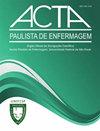安全文化:重症监护病房护士的认知
IF 1
4区 医学
Q3 NURSING
引用次数: 0
摘要
本文章由计算机程序翻译,如有差异,请以英文原文为准。
Cultura de segurança: percepção dos enfermeiros de Unidades de Terapia Intensiva
Objective: To measure patient safety culture from Intensive Care Unit nurses’ perspective. Methods: This is a cross-sectional descriptive study carried out with 65 nurses from Intensive Care Units of a tertiary public hospital, by completing the Hospital Survey on Patient Safety Culture questionnaire, using simple descriptive statistics for data analysis and following the Agency for Healthcare Research and Quality’s guidelines. Results: Of the total, 50% of nurses did not report any adverse events in the last 12 months; 50.8% of professionals assigned a fair score to patient safety in their work area/unit at the hospital; none of the dimensions had a rate of positive responses >75%, only isolated items such as C2 (Professionals are free to say when they see something that may negatively affect patient care), with 84.6%. Dimensions 6 (Nonpunitive responses to errors), 9 (Teamwork across hospital units) and 11 (Overall perceptions of safety) showed all items with an average percentage below (50%), and Dimension 6 (Nonpunitive responses to errors) was the weakest (22.5%). Descritores Cultura organizacional; Segurança do paciente; Enfermagem de cuidados críticos; Unidades de terapia
求助全文
通过发布文献求助,成功后即可免费获取论文全文。
去求助
来源期刊

Acta Paulista De Enfermagem
NURSING-
CiteScore
1.40
自引率
0.00%
发文量
92
审稿时长
4 weeks
期刊介绍:
Acta Paulista de Enfermagem – (Acta Paul Enferm.), ISSN 1982-0194, is a [bilingual] technical-scientific electronic publication of the Escola Paulista de Enfermagem – EPE, Universidade Federal de São Paulo – UNIFESP.
Our mission: To disseminate the scientific knowledge generated within the rigor of research and ethics methodology.
Our objective: To publish results of original research for advancement of practices of clinical, surgical, and management nursing, as well as education, research, and information and communication technology.
 求助内容:
求助内容: 应助结果提醒方式:
应助结果提醒方式:


